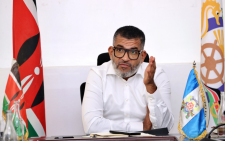Time for revolution in New Year resolutions

Given how last year turned out to be, many people are yet to recover from failed 2020 goals such that making new ones seem like an exercise in futility.
Sandra Wekesa @wekesa_sandra
Setting New Year resolutions after a year that upset so many people seem futile.
We are talking of postponed or cancelled weddings, financial insecurity, job loss, broken families among others.
For Immaculate Kerubo, her only hope this year is to heal from a broken heart. “Last year, my resolution was to legalise my union and start a family.
We had been living together with the man, who I thought was The One for the past eight years.
But all that changed when one day he woke up and decided to walk out from our relationship,” she says, trying to hide her shaking voice.
This made her adjust every expectation that she had. The fact that they hadn’t been going through any difficult motions or turbulent time sin their relationship before the breakup hurt her even more.
She cries for the eight wasted years. This year, Kerubo has decided to work on herself, picking her pieces.
Shadrack Kyove an independent consultant counselling psychologist from SamaSource Kenya says 2020 forced people to slow down and take new stock of their lives.
Hoping for a better year
But Brian Mungai, an accountant says setting resolutions is a decision he vowed to always adhere to despite the obstacles he might have encountered the previous year.
To him, 2020 was a trial year that he is glad he lived to witness. He lost his job and went through financial constraints that forced him to go back to the village.
“My 2020 resolutions were to work hard for a promotion and buying a piece of land that I would build a home.
But all that changed after Covid-19 pandemic hit. I was retrenched after the company started making losses and so I had to go back to Rumuruti, Laikipia county, my rural area,” he says.
With that in mind, he can only hope for a better year. “My goals are now different from the ones I have had the previous years. I plan to live healthy, save, and have a healthy relationship,” he reveals.
He says he wouldn’t want to categorise them as resolutions, but rather refer to them as practices.
But making resolutions doesn’t seem to be surprising to Kyove who says over the years, this has been a constant practice that needs to be looked at in a different perspective.
He adds that making resolutions had over the years become the norm, however, people hardly ever attained their set goals for the year as many were forgetten even before a quarter of the year lapsed. For instance, setting out to change ones habits.
“You might think it is easy to stop eating carbohydrates regularly to limiting it in order to attain your health or body goals.
But one important thing to note is that self- improvement goals do take a lot of energy and time,” Kyove says.
Overwhelming standards
Also having grappled with a global pandemic for an entire year is enough for one to realise that making a resolution with the uncertainties is pointless.
“While life seems to be getting back to normal, the virus is still here and until a solution is found, nothing major will change. Last year’s events are still carried forward to this year,” he adds.
On his part, Raymond Mwaura, a counselling psychologist explains that personal goals aren’t necessarily pointless, but overwhelming yourself with standards that need to be met while attaining the goal is what actually makes it pointless.
The only way to enjoy life, Mwaura says, is by letting go of resolutions and building yourself towards a change that you would be proud to embrace— one that will not be strenuous to achieve.
He notes it’s worth interrogating resolutions, which tend to be about attaining some kind of elusive, always-out-of-reach perfectionism.
These goals drive us to beat ourselves up when we fall short and too often create a disappointing sense of “what next?” when we achieve them.
“This past year, however, had a way of shifting our perspective in order to allow us to tap into our core values again — finding excitement in life, feeling close to our loved ones, feeling grounded in ourselves, being of service to our communities,” he says.
His advise? “Ask yourself what matters most to you in life. When we are faced with that question, the way we think about what in our lives needs adjusting and what counts as self-betterment fundamentally changes.”












